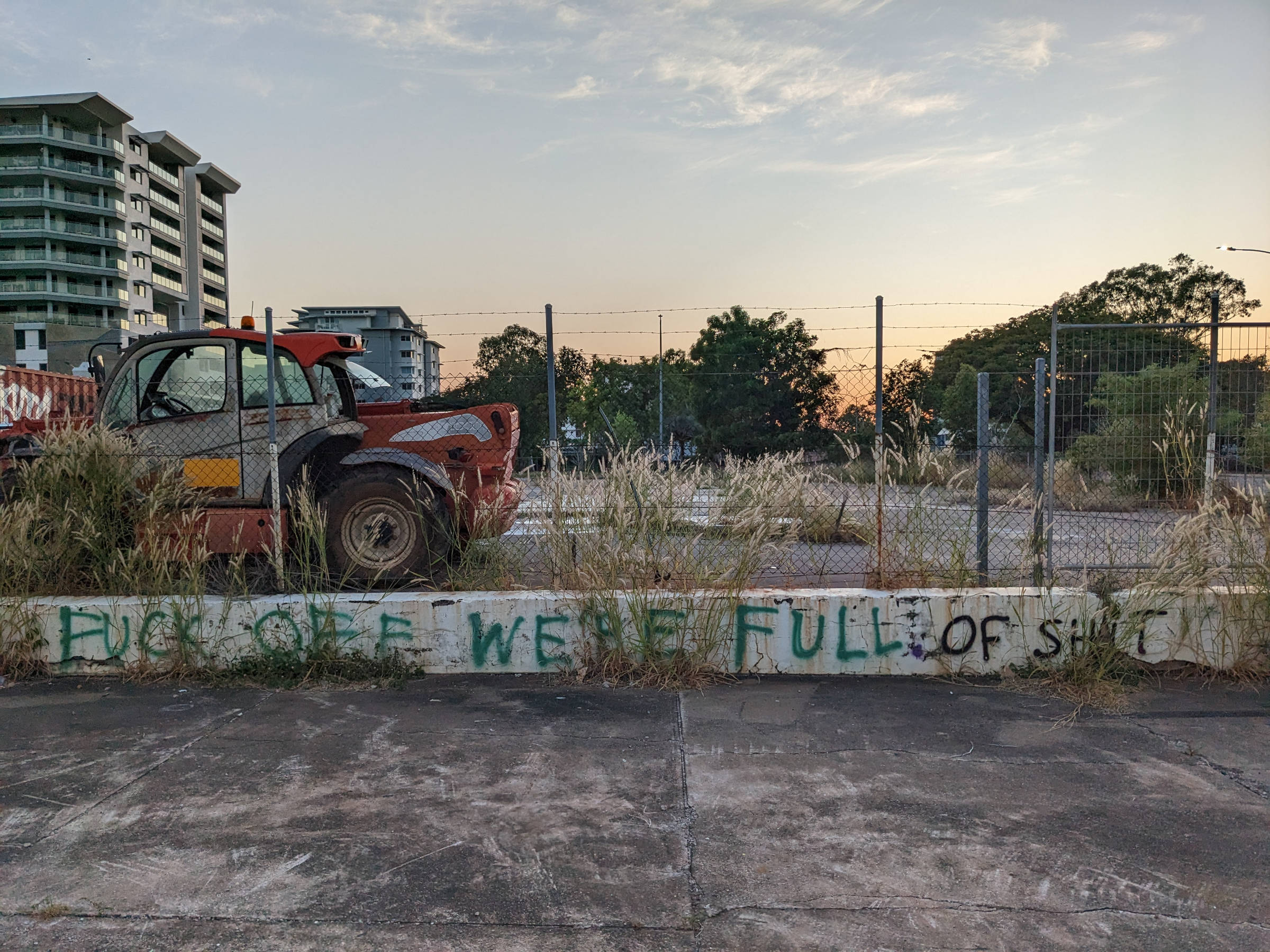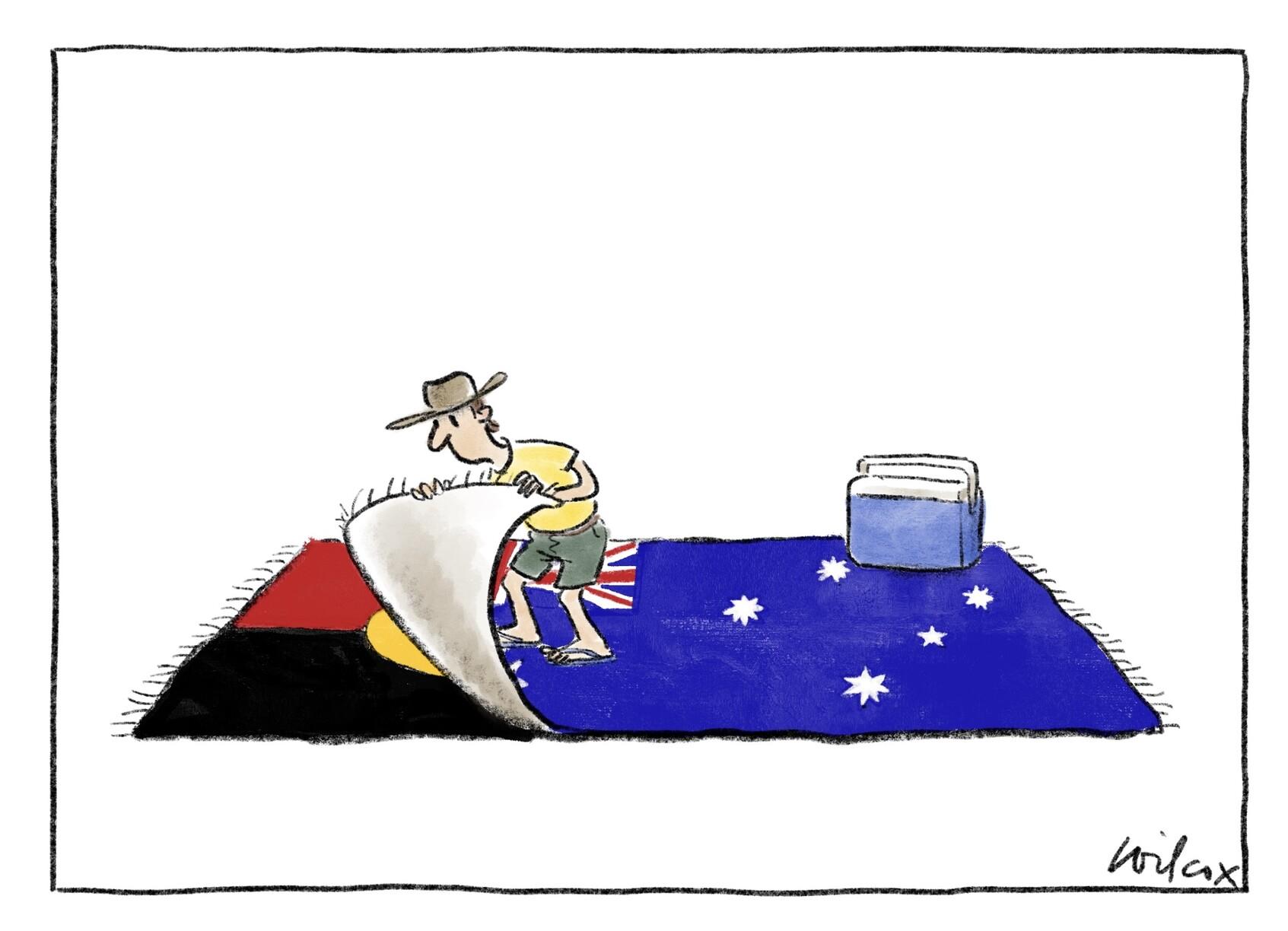I'm gathering these reflections on a beach in Darwin, the last great Australian city.
'Great Australian' things are inherently problematic. I once heard an entertainer reflect that there aren't many countries in the world that you can be 'un' in, and Australia is one of them. Un-Australian. Un-American.
Why would I label Darwin this, or use such problematic words for a place that doesn't exist in a way that seems framed as favourable? Well, there are layers to love. But if one is to love them, then they must be loved atop the proper foundations.
Larrakia is the proper place name to use for Darwin. It is 'proper' because it is its oldest name and the name shared with its people- those who are Larrakia as much as are from it. You cannot know a place nor speak for it unless you are grown from and with it.
Children of modernity no longer understand this. We have been brainwashed by the promise of objective reason.

To fuel this brainwashing, the Western world creates overlays. 'Darwin' is an overlay of that kind- a Colonial substrate built atop an Indigenous substrate that attempts to pave over this deeper world's complexities in a heavy imposition of sandstone and concrete. Neatly trimmed. Squarely organised. Easy to clean and to keep nature at bay. Buildings in Darwin make me think of Ivy League colleges interbred with towering Brutalist Berliner facades. Many of them have a soft yellow tone to them, but they are ominously huge and overbearing. They are built of an era when striking fear into the hearts of the local peoples was core to the design philosophy.
So, why, then? Why this 'great Australian' framing?
Darwin is a place in which the substrate shows its cracks. The imposition is not complete. There is tension in the air. Racial tension.
Yet, for me it is a strange tension. The tension of a paradoxical safety. An honest tension.
To explain, it is helpful to understand the culture of 'typical' Australian cities down the east coast- cities like Brisbane, Sydney and Melbourne. I notice that I often get unfavourable reviews from White Australians about Darwin. Those living comfortably in other population centres often struggle with anxiety about visiting. "Will I be accosted on the street?" "Harangued, cat-called, harassed?" "They're ferals up there!"
Sure, there's truth to that statement- there are a lot of ferals up there. But these perspectives miss a bigger truth. Dig a little deeper, and a lot of White folks' fear about Darwin would seem to come from the possibility of having a negative encounter with an Aboriginal person. Why this reflex? What is it about mainstream White Australian culture's relationship with its First Nations peoples that instils a sense of unsafety in people?
Well, I'd still recommend the previously linked documentary We Don't Need a Map to begin more thoroughly answering that question. Personally I observe a number of toxic and derogatory associations made between Aboriginal people and homelessness, alcoholism and domestic violence through the decades. An uncle of mine has been particularly trapped in this worldview- he himself a heroin addict for most of his adult life, today living in squalid state housing and smoking himself to death on cigarettes and Methodone. His own life not so far from such a reductive synopsis. Yet somehow he remains unable to empathise with the similarly disempowered Black people next door to him and convinced they are to blame for the world's ills, rather than genocidal billionaires like Musk and Trump or Liberal politicians like Abbott and Morrison.
Well, the Murdoch media propaganda diet will do that.
These associations all have their roots in the genocide of Australia's foundation. Massacres were done particularly thoroughly here even by Christian standards, as were the dispossession and destruction of ancestral lines and culture. Having your family forcibly separated and abused by the state tends to correlate highly with homelessness and other financial & health struggles.
In the larger cities, police are employed to sweep this discomfort and history out of view. The entrance to Fortitude Valley train station remains a long-contested sheltered encampment for the local homeless community, as does the mall up the hill. For many in Brisbane, their interactions with Aboriginal people (whether they be Yaggera, Toorbal, Wakka-Wakka or imports from elsewhere) are confined to these hurried encounters on the journey to work.
Homelessness and suffering are uncomfortable frames to meet anybody in, and it's not as though one doesn't meet many homeless White folks on the street living in Fortitude Valley too. But it does have an eroding effect on people's worldviews when they are already indoctrinated into xenophobia and when these are their sole experiences of 'others'. People simply... filter what they don't want to see. Like my uncle, who doesn't notice the feral White folks around him or that he is one of those ferals.
If that seems confronting, consider this other anecdote: the Sunshine Coast (about ~80min drive north of Brisbane CBD) is about the only place in the modern world that one can go to the beach on your average summer weekday, see literally hundreds of people there, and all of them be light-skinned.
Which is not to say that Aboriginal or other ethnically diverse people do not exist in those crowds (the "invisibility of race"); but it is to say that Australia, despite its assertion of itself on the world stage as a multicultural paradise*, is as cornbread as countries come.
(*Loosely asserting that when ethnic minorities immigrate here, they tend to congregate in cultural islands among the White suburban sea.)
A West Asian friend of my brother's actually moved to New York City with her partner some decades back, citing this as the reason. It's just too beige here to be comfortable for some non-White folks.
So this (I would argue) has become the cultural frame and cross-cultural relationship for Aboriginal people and White Australians. A rift of discomfort, shame, trauma, misunderstandings and blood. A rift that asserts itself in White refusal to acknowledge our responsibility for it. Quietly and invisibly on the margins of society.

The political climate is not like this in Darwin.
The weather is at least tropical if not safe for a lot of the year (in summer the air is like a petri dish and every small cut turns into an infection), and so Larrakia are here. They are here sitting in circle in parks, at bus stops, around the local lagoon in the high-end resort at the end of town. They take up space.
This is quite different to the mostly-invisiblised intersection between Aboriginal people and White Australia in a city like Brisbane.
It would be a mistake to say that homelessness does not exist in Darwin, but I think it's also fair to say that what is perceived as homelessness by Whites visiting Darwin is more often people at home than in any state of acute suffering or precarity. They are simply here.
And they are not taking shit from any Whitefullas. Whereas a White person in Brisbane might get away with a certain amount of covert racist behaviour and even overt bigotry expressed against Black folks and still be able to fade into the background consequence-free; in Darwin that behaviour is not going to fly. In Darwin you're much more likely to get beaten up for being racist.
Of course, the miners from Queensland bring their racism with them when they visit; and fly-in, fly-out workers are always occupying red-eye flights back to more 'civilised' population centers down the east coast alongside penniless backpackers.
Whenever I encounter a beetroot-faced old White Boomer racist on the street in Darwin and find myself wondering whether his blood pressure is linked to his bigotry, I am often also wondering whether he's a Queenslander. As somebody who got stuck in Brisbane for 15 years I can tell you with some certainty that it's a Colonial enclave eking out a life on extractive industries and expensive self-perpetuating infrastructure. Government and mining- that's what we do there. Queensland's biggest coal port in Gladstone is not far away (by Australian standards), and nor is the world's largest in Newcastle. Our state governments are talking about repealing women's reproductive rights too, by the way.
I tangent, but it's also all connected. Bell Hooks didn't label it the White Supremacist Capitalist Patriarchy for no reason.
But Darwin resists. Darwin, genuinely and uncomfortably, is the modern multicultural Australian city in all its complex diversity. Its proximity to Asia and the Pacific brings with it a cross-pollination of Polynesian, East-Asian and First Nations peoples, cultures, skin tones, genders, garments and customs. A vibrant diversity that gets up in your face and challenges any comfortable sense of 'normalcy'.
Darwin knows that there is no such thing.
The cost of this dynamism and vibrancy is that the simmering racist undercurrent and aggression towards non-White people that permeates the Australian psyche is pushed out into the open. It is confronted, cornered, and has nowhere left to go. The diversity overwhelms it. It acts out.
It is not uncommon to receive advice like, "now don't go giving the Blacks any money or they'll keep coming back for more" from these archetypically beetroot-faced older White people in Darwin. (Imagine it pronounced with a thick nasal Australian accent.) This is how racists attempt to normalise their bigotry.
In doing so, that bigotry renders itself more visible. It gasps out. It is on its dying breath, and flailing violently on death's threshold as all things do when their time inevitably comes.
There is no room left for bigotry to hide in a world where difference is visible and accepted.
The aggression spills back over. It is returned in kind. Reactions beget reactions. Some of them bubble all the way back up the chain of dominator hierarchies to the able-bodied heterosexual cisgender White males at the top.
Violence made visible against the oppressor demands that those with the most privilege also examine the effects of power, race, gender and class. Now, their violence affects them too.
This is the only way that hegemonic violence will ever be questioned en-masse. Privilege cannot see itself, and requires resistance from those it oppresses in order to be fully examined.
Certainly as a visibly non-binary trans person I feel safer, more accepted, more normal, less gawked at, less ridiculed, and less threatened with violence (sexual, physical, gang or otherwise) in Darwin than I ever did in Brisbane or in regional Australia. I am less anxious, less vigilant, and less prone to scanning for threats. More confident that the social environment will protect me if some aggression does occur.
The paradoxical safety of marginalisation in an environment where violence is distributed more evenly.
It seems I am not alone in this experience. I have had gentle words of affirmation and agreement on this topic from Aboriginal, Balinese, Vietnamese and third culture Australians as well as parallel insights on New Zealand & US culture from non-White immigrants.
I'm certain that all of our experiences of marginalisation are very different. But this perspective seems to be, at least, one that does not challenge them in the same way that it seems to challenge White people.
I would argue that Australia's racial history and current-day political climate has a lot to teach the rest of the world about power and privilege, safety and comfort, bigotry and tolerance.
But whether we're able to demonstrate these teachings (even to ourselves) depends on our ability to collectively lean towards that discomfort with curiosity and compassion. This means facing the whole of ourselves- the bad and the ugly as well as the good and the beautiful, letting go of virtue and righteousness, and creating space for those who have suffered to be heard, to heal, and to lead us toward caring futures.